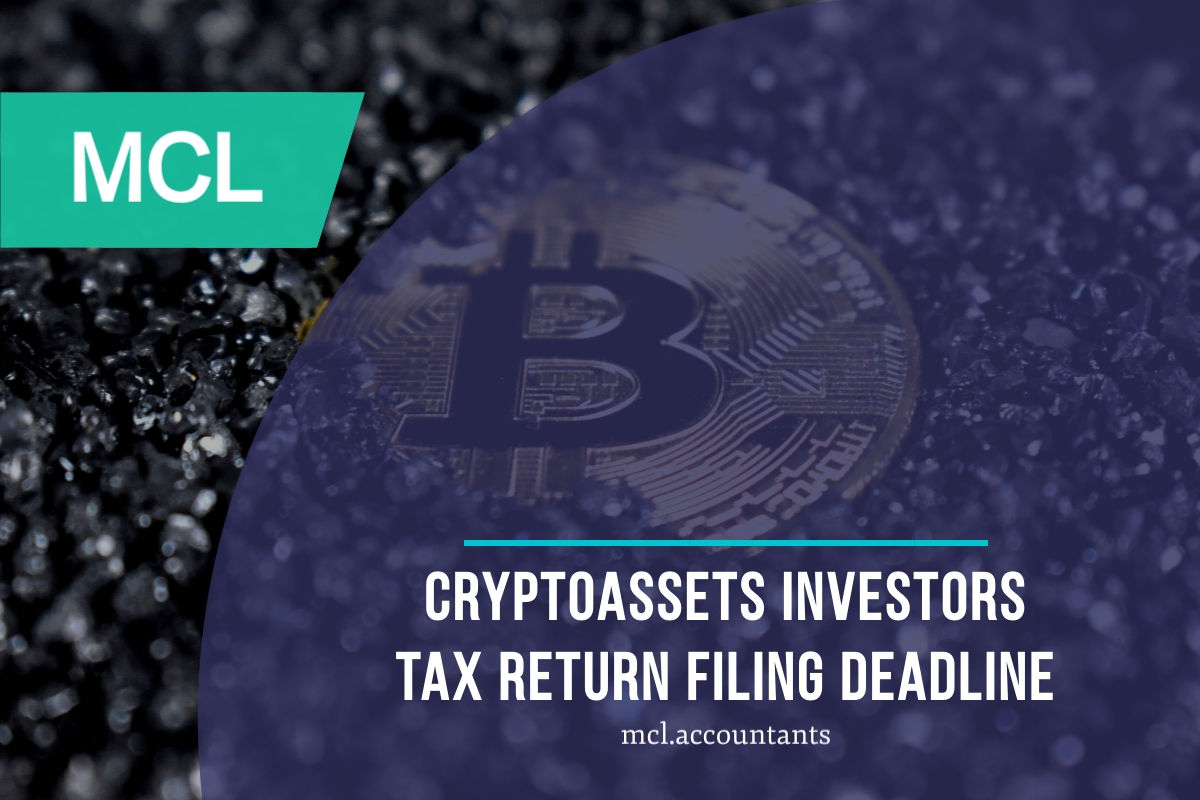Cryptoassets Tax Return Filing Deadline – Reminder for Crypto Investors
20/01/2024 - 5 minutes readCryptoassets users have been urged by HMRC to avoid potential penalties and check if they need to complete a Self Assessment tax return for the 2022 to 2023 tax year.
Cryptoassets users are subject to the same tax return filing deadline of 31st Jan 2024.

Cryptoassets (also referred to as ‘tokens’ or ‘cryptocurrency’) are cryptographically secured digital representations of value or contractual rights that can be:
- – transferred
- – stored
- – traded electronically
There are different types of cryptoassets, which work in different ways.The main types of cryptoasset include:
- – Exchange Tokens
- – Utility Tokens
- – Security Tokens
- – Stablecoins
How HMRC Treats Cryptoassets
The tax treatment of all types of tokens is dependent on the nature and use of the token and not the definition of the token.
HMRC does not consider cryptoassets to be currency or money. This reflects the position previously set out in the Cryptoasset Taskforce report.
On its own, owning and using cryptoassets is not illegal in the UK and does not imply tax evasion or any other illegal activities.
Anyone with cryptoassets should declare any income or gains above the tax-free allowance on a tax return. Tax may be due when a person:
- -receives cryptoassets from employment, if they’re held as part of a trade, or are involved in crypto-related activities that generate an income
- -sells or exchanges cryptoassets, including:
- selling cryptoassets for money
- exchanging one type of cryptoasset for another
- using cryptoassets to make purchases
- gifting cryptoassets to another person
- donating cryptoassets to charity
Visit GOV.UK to find out more information about how cryptoassets are taxed.
Cryptoassets Tax Return Filing Deadline
The deadline to complete a tax return and pay any tax owed is 31 January 2024. If customers are unsure whether they need to complete a tax return, they can check by using the free online tool on GOV.UK.
Myrtle Lloyd, HMRC’s Director General for Customer Services, said:
People sometimes forget that information about crypto-related income and gains need to be included in their tax return. Some people affected may not have had to do a tax return before, so it is important people check. With the Self Assessment deadline just a matter of weeks away, I am urging people not to put off completing it.
Help is at hand – you can access a wide range of resources and support online, just search ‘help with Self Assessment’ on GOV.UK.
Customers who are unable to pay in full can access support and advice on GOV.UK. HMRC may be able to help by arranging an affordable payment plan, known as Time to Pay for customers who owe less than £30,000. Customers can arrange this themselves online. Go to GOV.UK and search “HMRC payment plan” for more information.
HMRC will consider a customer’s reasons for not being able to meet the deadline. Those who provide HMRC with a reasonable excuse may avoid a penalty. The penalties for late tax returns are:
- – an initial £100 fixed penalty, which applies even if there is no tax to pay, or if the tax due is paid on time
- – after 3 months, additional daily penalties of £10 per day, up to a maximum of £900
- – after 6 months, a further penalty of 5% of the tax due or £300, whichever is greater
- – after 12 months, another 5% or £300 charge, whichever is greater
There are also additional penalties for paying late of 5% of the tax unpaid at 30 days, 6 months and 12 months. Interest will also be charged on any tax paid late.
How can MCL Accountants help?
Contact MCL Accountants on 01702 593 029 if you need any assistance with the preparation and submission of your business accounts or self-assessment tax returns to HMRC.
- ABOUT
- REQUEST A QUOTE
Ishan provides financial management, taxation and transactional advice to business entities of all sizes. His expert areas include statutory compliance, business taxation, personal tax & transactional processing and systems. Industry sectors include professional services, retail, hospitality and entertaining & media and advertising services.

0 Comments